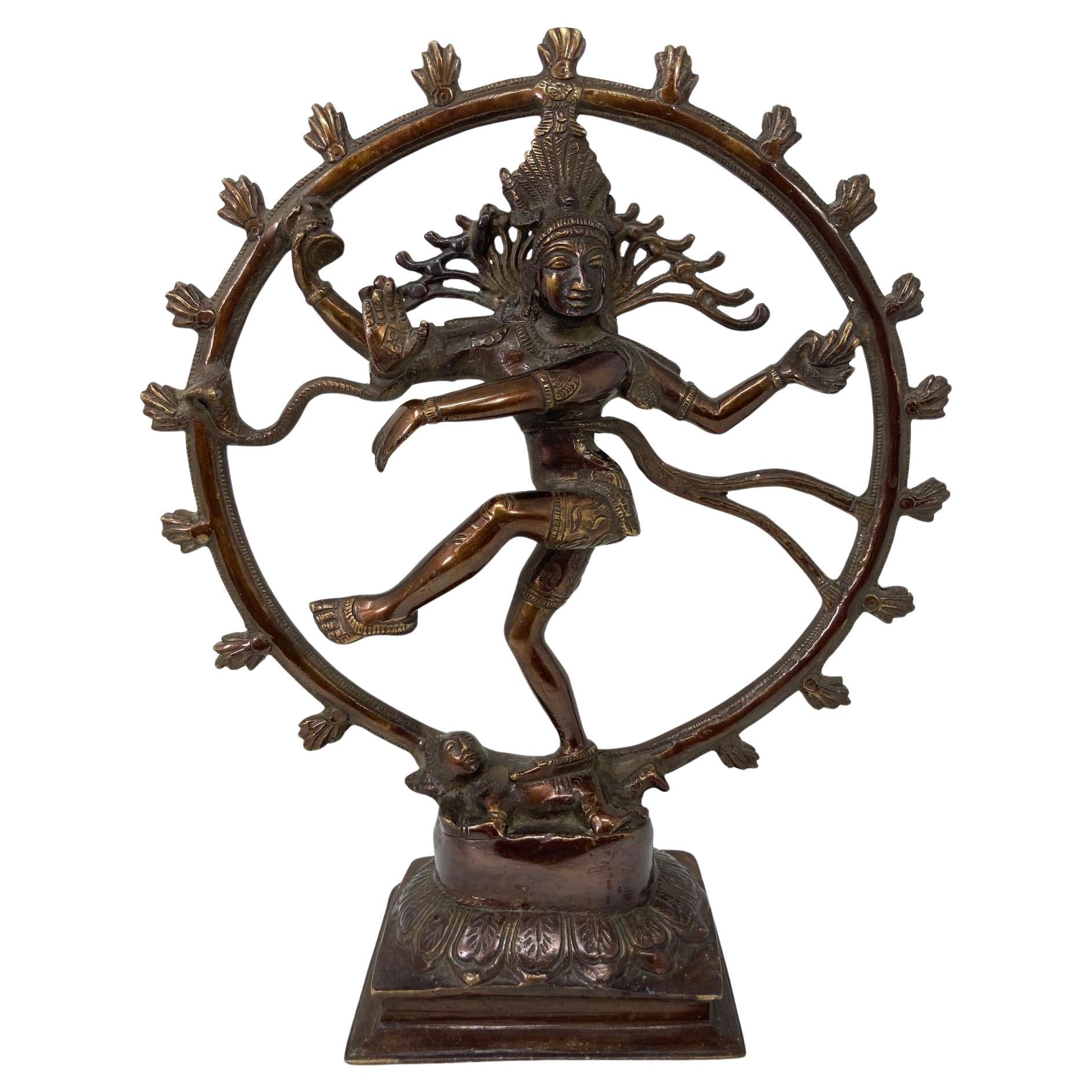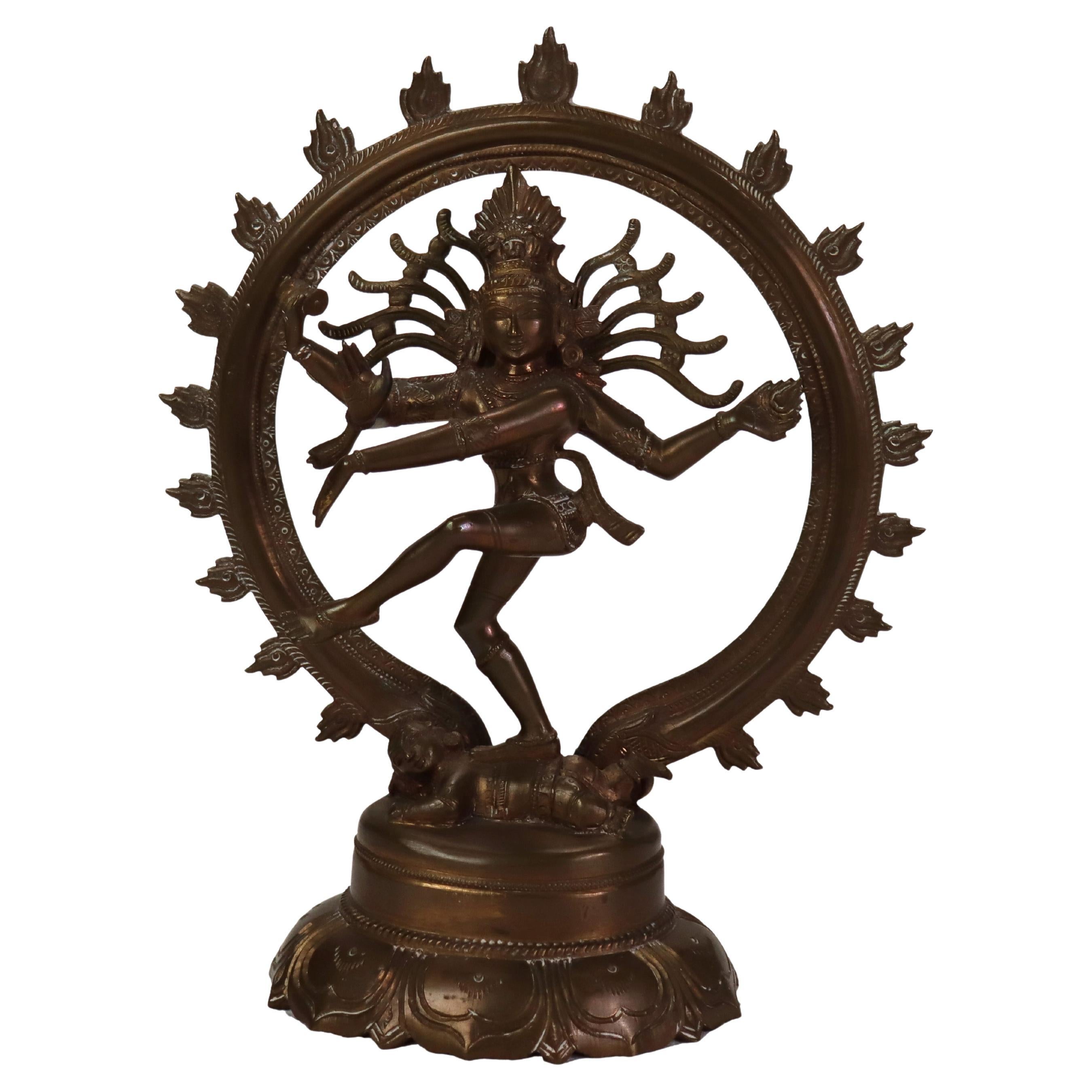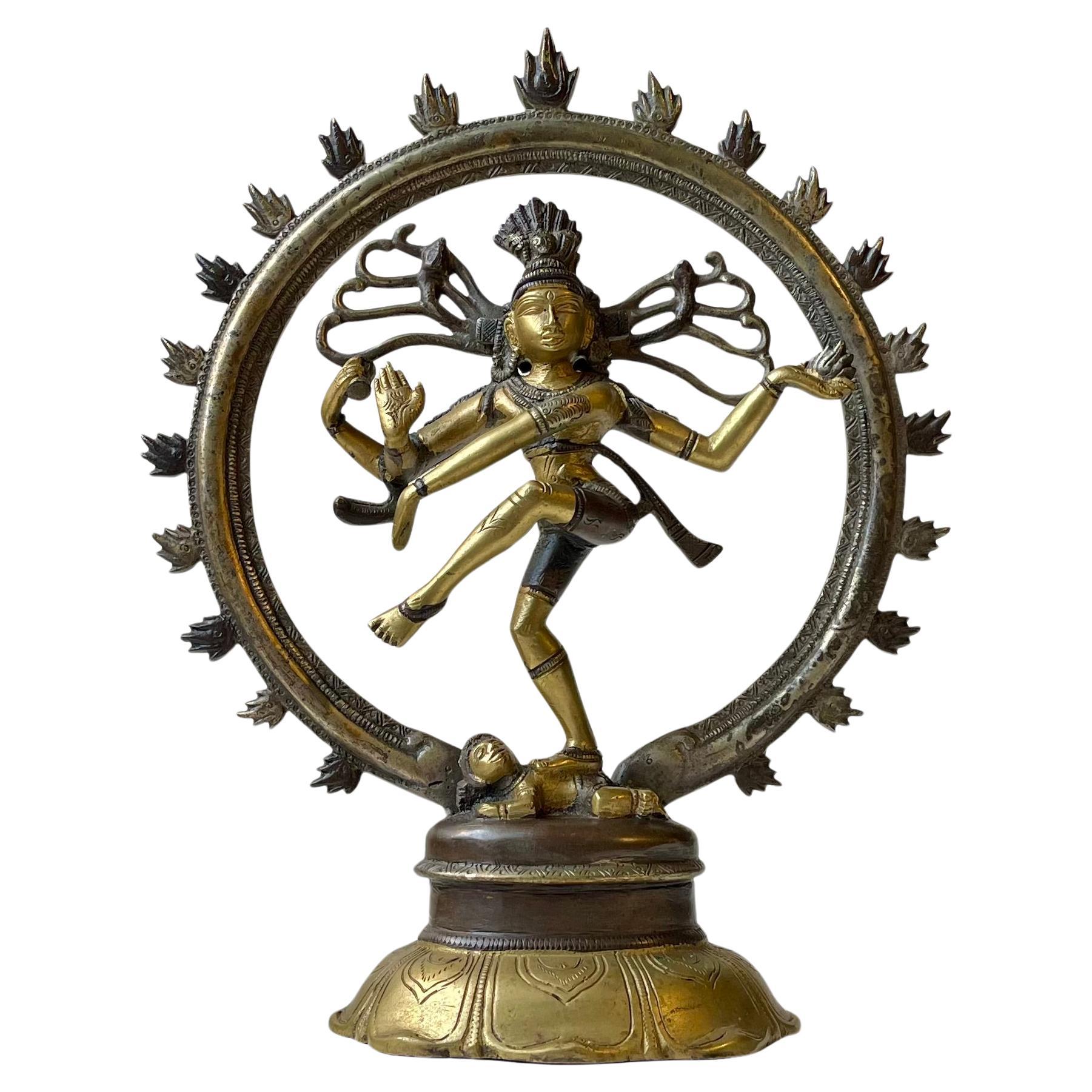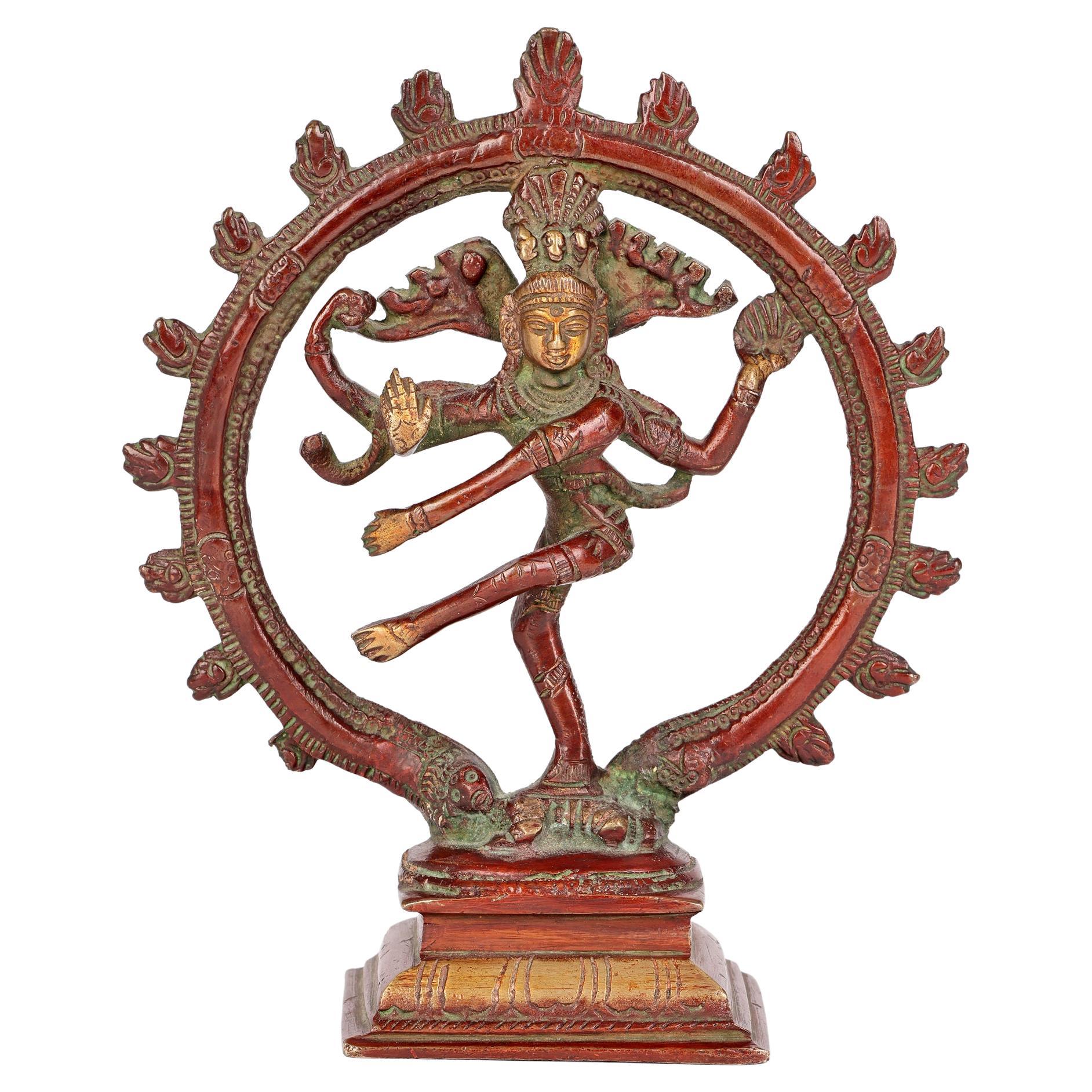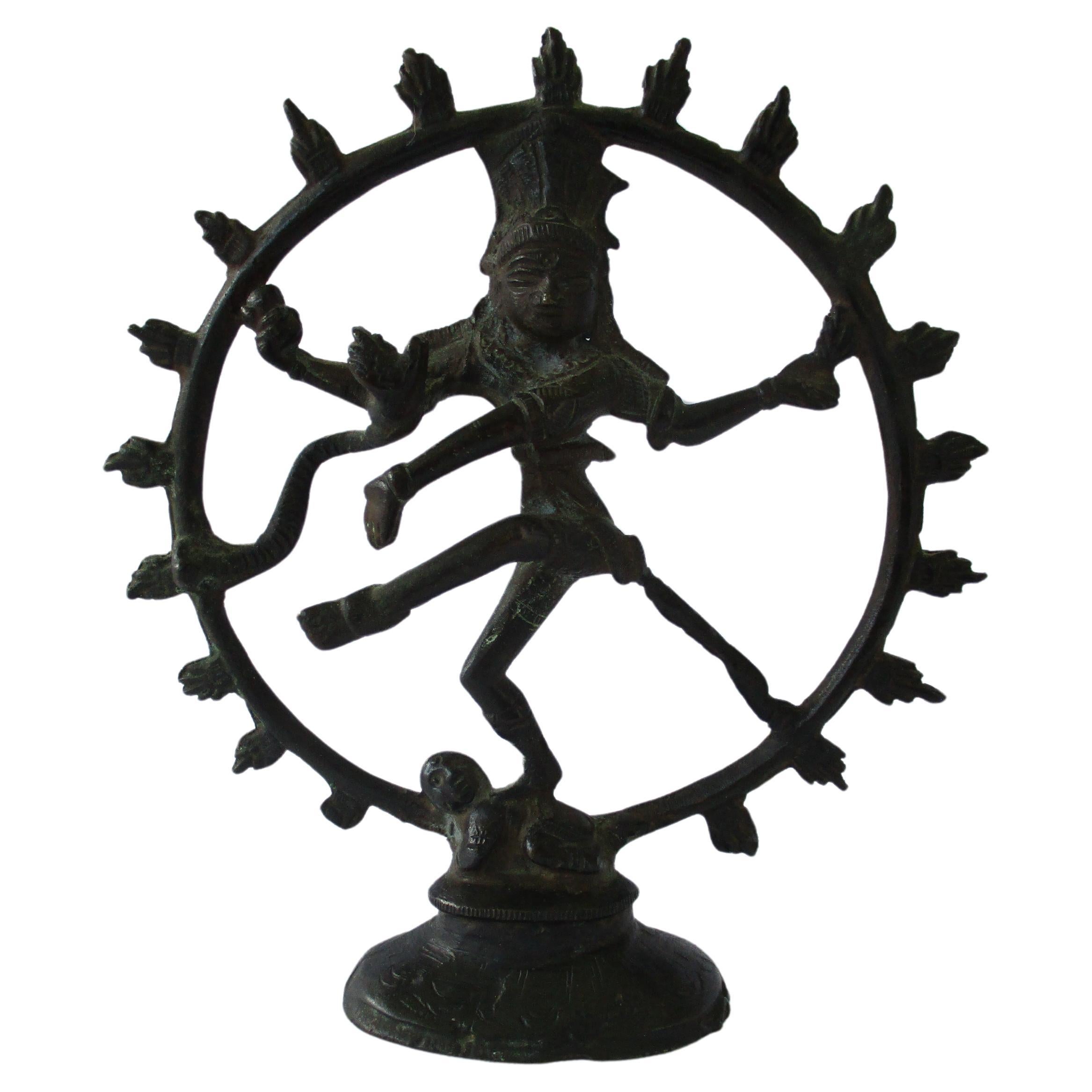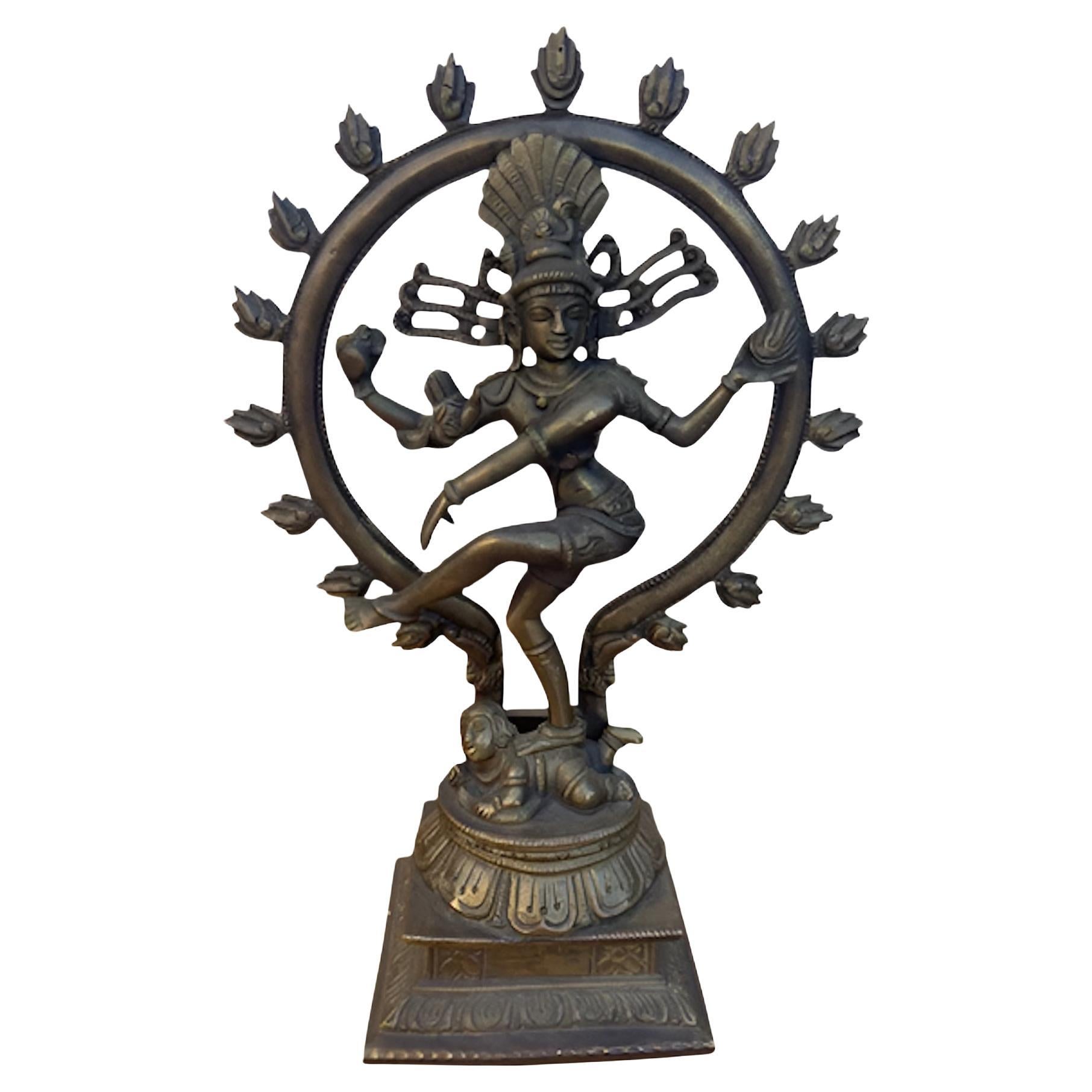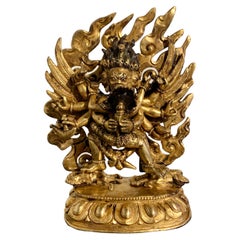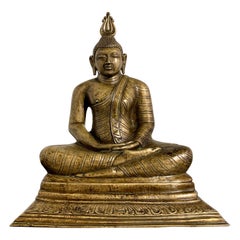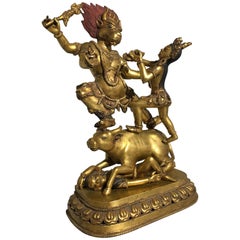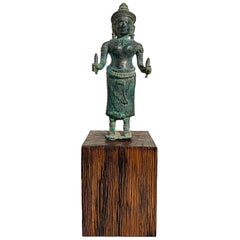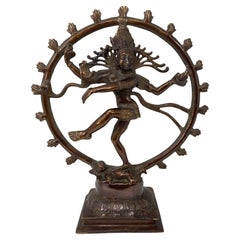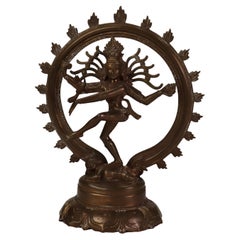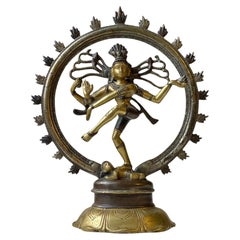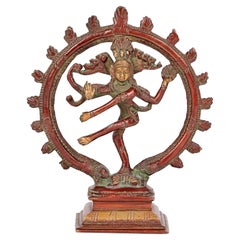Items Similar to Large Bronze Dancing Shiva, Nataraja, 19th/20th Century, South India
Want more images or videos?
Request additional images or videos from the seller
1 of 14
Large Bronze Dancing Shiva, Nataraja, 19th/20th Century, South India
$7,800
£5,918.46
€6,767.23
CA$10,894.48
A$12,113.19
CHF 6,324.84
MX$147,446.96
NOK 80,702.16
SEK 75,614.07
DKK 50,505.09
Shipping
Retrieving quote...The 1stDibs Promise:
Authenticity Guarantee,
Money-Back Guarantee,
24-Hour Cancellation
About the Item
A heavy and well cast South Indian bronze figure of Shiva Nataraja, or Shiva as Lord of the Dance, in the Chola style, late 19th or early 20th century, India.
Shiva is portrayed here in his form as Nataraja, the Lord of the Dance. An iconic and powerful image, Shiva is portrayed engaged in his dance of creation, protection, and destruction, bringing together all his aspects into one sublime form.
Shiva dances ecstatically, facing the viewer with his body twisted, his long locks of hair streaming out around him, his four arms in action, with one leg raised, the other stomping on the dwarf demon Apasmara, who represents spiritual ignorance.
In one hand he holds a damaru, or ritual drum, which he uses to create the beat of his dance, giving rhythm to the universe. Another hand holds the agni, or purifying fire, symbolizing the power of destruction and un-creation. One primary hand set in abhaya mudra, the gesture of dispelling fear, with a cobra coiled around the upper arm, its body and head extended out towards the flaming halo. The other arm is crossed in front of him, his hand pointing down towards his raised foot. A flaming mandorla or halo surrounds the dancing figure, said to represent the whole of the cosmos.
Shiva wears a tiger skin covering the lower part of his body. His bare chest, arms and legs adorned with various jewels. His unkempt hair streams out around him. Within his hair is the goddess Ganga, personification of the Ganges river. Other elements in his hair include a cobra, a skull, and a crescent moon, all symbols associated with Shiva.
Shiva looks outwards with a calm and benevolent expression and wearing a slight smile upon his face. His sharp nose, plump lips, large almond shaped eyes, and high arched brows all well defined. A third eye present in the middle of his brow. His body is youthful and lithe as he dances effortlessly and gracefully, without and strain or discomfort.
The sculpture supported by an integral multi-tiered lotus pedestal. The lower tier of rectangular form, the upper tier of oval form.
The bronze patinated, and of a lovely warm, coppery bronze color.
- Dimensions:Height: 24 in (60.96 cm)Width: 20 in (50.8 cm)Depth: 7.5 in (19.05 cm)
- Materials and Techniques:
- Place of Origin:
- Period:1900-1909
- Date of Manufacture:19th-20th Century
- Condition:Wear consistent with age and use. In very nice condition. With some slight areas of discoloration and verdigris to the bronze at the base, as seen in photos. The hair with some movement.
- Seller Location:Austin, TX
- Reference Number:1stDibs: LU894730453372
About the Seller
5.0
Platinum Seller
Premium sellers with a 4.7+ rating and 24-hour response times
Established in 2001
1stDibs seller since 2010
345 sales on 1stDibs
Typical response time: <1 hour
- ShippingRetrieving quote...Shipping from: Austin, TX
- Return Policy
Authenticity Guarantee
In the unlikely event there’s an issue with an item’s authenticity, contact us within 1 year for a full refund. DetailsMoney-Back Guarantee
If your item is not as described, is damaged in transit, or does not arrive, contact us within 7 days for a full refund. Details24-Hour Cancellation
You have a 24-hour grace period in which to reconsider your purchase, with no questions asked.Vetted Professional Sellers
Our world-class sellers must adhere to strict standards for service and quality, maintaining the integrity of our listings.Price-Match Guarantee
If you find that a seller listed the same item for a lower price elsewhere, we’ll match it.Trusted Global Delivery
Our best-in-class carrier network provides specialized shipping options worldwide, including custom delivery.More From This Seller
View AllSino-Tibetan Gilt Bronze Hayagriva with Consort Vajravarahi, circa 1800, Tibet
Located in Austin, TX
A fantastic and powerful Sino-Tibetan gilt bronze figure of Hayagriva and his consort Vajravarahi, created in Tibet for the Chinese market, 18th/19th century, Tibet.
The wrathful...
Category
Antique Early 1800s Tibetan Tibetan Sculptures and Carvings
Materials
Bronze
Sri Lankan Cast Bronze Seated Buddha, Kandyan Style, Early to Mid 19th Century
Located in Austin, TX
A large and heavy well cast bronze image of the Buddha seated in meditation, late or just post Kandyan period (1597 - 1815), early to mid 19th century, Sri Lanka.
The Buddha sits ...
Category
Antique Mid-19th Century Sri Lankan Sculptures and Carvings
Materials
Bronze
Large 20th Century Nepalese Gilt Bronze Figure of Yama and Yami
Located in Austin, TX
A large and impressive Nepalese tantric gilt bronze figure of the dikpala Yama and his sister, Yami, early to mid-20th century (1920s-1940s).
Well cast and richly gilt, the buffalo headed dikpala (directional guardian) of the South stands upon the back of a bull trampling a prostate figure. Yama is portrayed here in his four armed form. His primary arms hold a flaming kapala (skull cup...
Category
Mid-20th Century Tibetan Tibetan Sculptures and Carvings
Materials
Coral, Bronze
Khmer Bronze Uma, Angkor Wat Style, 12th Century, Cambodia
Located in Austin, TX
A small Khmer bronze figure of the Hindu goddess Uma, Angkor Period, Style of Angkor Wat, circa 12th century, Cambodia.
This small Khmer bronze devotiona...
Category
Antique 15th Century and Earlier Cambodian Sculptures and Carvings
Materials
Bronze
Nepalese Gilt Bronze Figure of Bodhisattva Chenrezig, Mid-20th Century
Located in Austin, TX
A nice vintage early to mid-20th century gilt bronze sculpture of the Buddhist deity Avalokiteshvara in his four armed form, known as Chaturbuhja, or Chenrezig in Tibet.
Chenrezig, a form of Avalokiteshvara, the bodhisattva of compassion (known as Guan Yin or Kwan Yin in Chinese), sits in vajrasana upon a high double lotus pedestal. One pair of hands is clasped in prayer at heart level, the other pair of hands raised upwards at shoulder lever and holding discreet attributes, a mala (prayer beads) in one hand, a lotus blossom in the other.
Chenrezig is dressed in an elaborately patterned floral dhoti that covers his lower half. His torso bare, shoulders covered with a shawl and scarves that billow out around him. He is festooned with jewels, necklaces, bracelets, armlets, earrings, belt and a five pointed crown. The earrings studded with coral. The crown studded with turquoise. His face is cold painted with beautiful details. The hair has been pigmented blue with crushed lapis, indicating his peaceful nature.
The copper base plate is inscribed with a visvajra (double vajra...
Category
Late 20th Century Nepalese Tibetan Sculptures and Carvings
Materials
Coral, Lapis Lazuli, Bronze
Large Burmese Bronze Medicine Buddha, Pagan Style, Late 19th Century
Located in Austin, TX
A large and magnificent cast bronze image of the Medicine Buddha, Bhaisajyaguru, rendered in the Burmese Pagan style, and most likely based on a period example that was either damaged or lost, 19th century, Burma or Thailand.
He can be identified as the Medicine Buddha by the hand that rests in his lap, with his middle finger touching the thumb. A medicine pot or fruit stem would originally have been placed in his upturned palm.
The face of this Buddha has been sculpted masterfully. He has a beautiful heart shaped face topped by hair neatly arranged in the typical "snail shell curls", and surmounted by a high ushnisha. Long, pendulous earlobes frame his face, a symbol of his princely past. He gazes serenely outwards from heavily lidded, downcast eyes, a content smile upon his full, lush lips.
The Buddha is portrayed seated in vajrasana (full lotus position), his elegant hands displayed in varada mudra, the gesture of granting favors and fulfilling wishes. Long, exquisite fingers extended, the thumb and middle finger touching in a gesture of compassion.
He is clothed in a simple kasaya wrapped around his body and over one shoulder, leaving the shoulder and part of his chest bare. The diaphanous garment clings to his body, outlining his well proportioned and graceful, almost sensuous, form. The excess material pooled in neat pleats in front of him. A sash thrown over his shoulder.
He sits upon a double lotus base upon a raised platform. The platform features two kneeling attendants, usually interpreted as the monks Ananda and Kasyapa. Between them is a circular disc representing the Wheel of Dharma. Contained in the disk is a flower with eight petals, symbolizing the eightfold path, one of the principle teachings of the Buddha.
The sides and back of the platform featuring a series of singha, or lions, representative of the Buddha's royal past.
An applied lacquer patina covers the entirety of the image. Large deposits of ash (from incense) are present between the curls of the hair, as well as some the other crevices, indicating this image was the subject of worship for many years.
Bhaisajyaguru, also called the Medicine Buddha, or Buddha of Healing, is a revered figure in the Buddhist pantheon as a master able to cure suffering, both physical and spiritual, through his teachings.
The Pagan Empire ruled most of present day Burma (Myanmar) from 849 to 1297. The capital, Bagan, served as a both the center of government and religion, where Buddhism reigned supreme. Bagan was also at a crossroads of the Buddhist world, with influence from India, Nepal, Tibet, China, and even Indonesia shaping their culture. As such, Pagan Buddha...
Category
Antique Late 19th Century Burmese Sculptures and Carvings
Materials
Bronze
You May Also Like
Asian Dancing Hindu Bronze Copper Shiva Nataraja Circa 1950
Located in North Hollywood, CA
Vintage heavy Indian patinated copper bronze statue of Shiva Nataraja.
An Indian metal alloy copper model of Shiva Nataraja.
"The Hindu God Shiva performs his dance of Bliss"
In the ...
Category
Mid-20th Century Indian Tibetan Sculptures and Carvings
Materials
Bronze
Indian Bronze Nataraja Dancing Shiva Statue 20thC
Located in Big Flats, NY
Indian Bronze Nataraja Dancing Shiva Statue Unsigned 20thC
Measures - 9.75"H x 8.5"W x 35"D
A finely crafted bronze statue depicting Nataraja, the...
Category
20th Century Asian Metalwork
Materials
Metal
$280 Sale Price
20% Off
Vintage Nataraj Dancing Shiva Sculpture in Bronze, 1970s
Located in Esbjerg, DK
A vintage Hindu Dancing Shiva - Nataraja Lord of Dance - Dancing in a ring of fire. Cast in Bronze/brass with silver-plate details and hand-etchings. Mad...
Category
20th Century Asian Anglo-Indian Figurative Sculptures
Materials
Silver Plate, Brass, Bronze
Indian Asian Lacquered Bronze Dancing Hindu Shiva Nataraja
Located in Bishop's Stortford, Hertfordshire
A fine and unusual vintage Asian Indian red lacquered bronze statue of Shiva Nataraja dating from the 20th century. The figure represents the Hindu God Shiva performing a dance. The ...
Category
20th Century Indian Anglo-Indian Metalwork
Materials
Bronze
Shiva Statue Nataraja Dancing Bronze Sculpture
By Shiva Lingam
Located in Vienna, AT
Shiva is one of the main gods of Hinduism. In Shivism, he is considered to the believers as the most important manifestation of the Supreme. As part of the "Houtuistic Trinity" (Trim...
Category
Antique 19th Century Indian Anglo-Indian Figurative Sculptures
Materials
Bronze
Antique Indian Gilt Bronze Shiva Nataraja - The Lord of Dance Statue
Located in Chicago, IL
Antique Indian Gilt Bronze Shiva Nataraja - The Lord of Dance Statue
An iconic and powerful image, Shiva is portrayed engaged in his dance of creation, protection, and destruction, ...
Category
20th Century Indian Rustic Sculptures and Carvings
Materials
Bronze
More Ways To Browse
Jewels Of India
Bronze Dancer
Antique Bronze Color
Bronze Sculpture India
Large Bronze Cross
Antique South Indian Furniture
Indian Arch
Moon Sculpture Bronze
Asian Drums
Pedestal India
Antique Bronze Tiger
Indian Antique Chests Chests Indian
19th Century Bronze Goddess Sculpture
19th Century Indian Bronze
Bronze Skull
Indian Head Sculpture
Tiger Carving
Antique Tiger Eye
